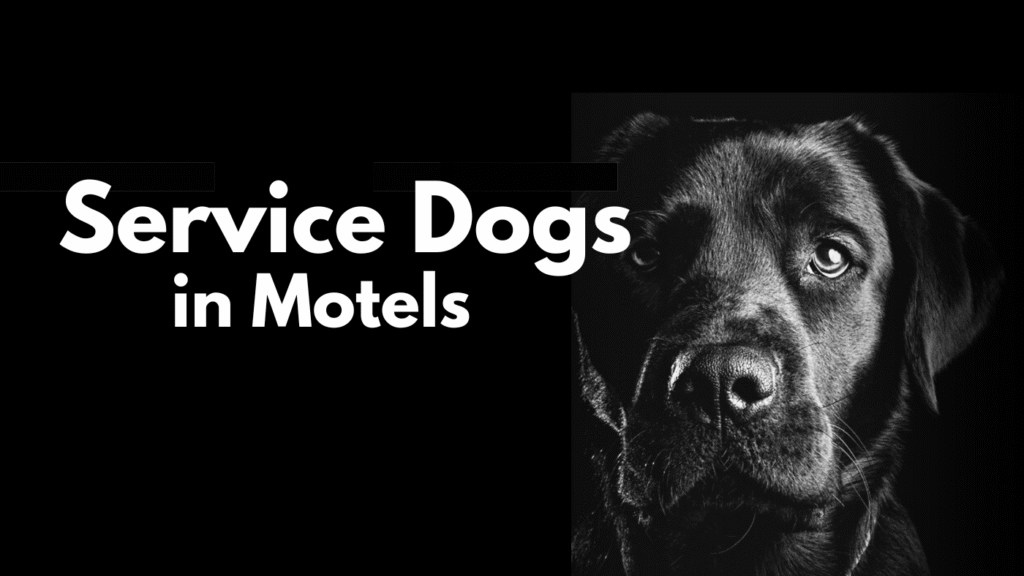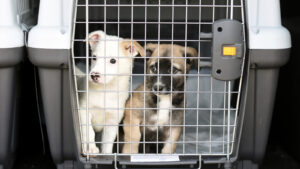At Alaska Dog Works, we believe that every service dog placement is more than just a graduation day, it’s a moment of independence and transformation for a client. This September, our lead service dog trainer, Michele Forto, traveled to Juneau, Alaska, to deliver a service dog to its new handler in Skagway.
The trip was supposed to be straightforward: a flight to Juneau, a motel stay, rideshare transportation, and finally a ferry ride on the Alaska Marine Highway to reach Skagway. Instead, Michele ran into a series of obstacles that revealed a painful truth, many businesses and service providers still don’t understand the rights of people traveling with service dogs.
When the Motel Check-In Went Wrong
After a long travel day, Michele arrived at a Juneau motel expecting to check in smoothly. Instead, the desk clerk gave her a hassle about bringing the service dog inside.
When Michele pointed out, “Your website says you are pet-friendly,” the clerk replied bluntly: “Not anymore.”
This exchange highlights a widespread problem. Service dogs are not pets, and whether a hotel is “pet-friendly” has no bearing on its legal obligation to accommodate service animals. Under the Americans with Disabilities Act (ADA), hotels and motels are required to allow service dogs to accompany their handlers anywhere the public is allowed.
ADA Guidelines for Lodging Providers
Hotels, motels, and other lodging businesses must follow these rules:
Service dogs must be permitted regardless of “pet policies.”
No extra fees may be charged for service dogs (even if fees apply to pets).
Limited questions only: staff may ask if the dog is a service animal and what tasks it performs, but they cannot demand documentation, special tags, or proof.
Equal access: service dogs must be allowed in guest rooms, lobbies, breakfast areas, and anywhere else open to guests.
The motel clerk’s response not only created stress for Michele, it would have been an unlawful denial if directed at a disabled guest traveling with their own service dog.
The Uber Ride: Confusion Between Service Animals and Pets
The motel incident wasn’t the only barrier Michele faced. Earlier in the trip, an Uber driver hesitated to transport her with the service dog. The confusion stemmed from Uber Pet, a paid feature for riders traveling with pets.
But here’s the important distinction:
Uber Pet is for pets. Riders may bring small animals for an additional fee.
Service dogs are not pets. Uber’s official Service Animal Policy explicitly states that drivers cannot deny rides, charge fees, or refuse service to riders traveling with service dogs.
This means service dog users should never be charged Uber Pet fees, nor can they be refused service because of allergies, fear, or vehicle cleanliness concerns.
Why These Issues Matter for Service Dog Teams
For Michele, these incidents were obstacles in a work trip. But for someone who depends on a service dog every day, the stakes are much higher. Denial at a motel desk or a refusal from a rideshare driver can mean:
Missing critical medical appointments
Being stranded in unfamiliar places
Facing unnecessary embarrassment and conflict
Losing confidence in their independence
Travel already carries stress. For Alaskans with disabilities, accessibility barriers like these make basic mobility even harder.
The Alaska Context: Ferries, Flights, and Remote Communities
Delivering a service dog to Skagway isn’t as simple as driving across town. Alaska’s unique geography means that service dog teams often need to rely on:
Air travel into regional hubs like Juneau
Hotels and motels for overnight stays
Rideshare or taxis for local transportation
The Alaska Marine Highway System for ferry travel between coastal towns
Each of these touchpoints creates opportunities for misunderstanding or denial if businesses aren’t trained in ADA compliance. A handler who encounters resistance at every step may feel discouraged from traveling altogether.
How Alaska Dog Works Prepares Teams for Real-World Travel
Our service dog program doesn’t stop at obedience commands. We prepare dogs, and their handlers, for the realities of living and traveling in Alaska.
Public Access Training: Dogs are exposed to airports, ferries, hotels, restaurants, and rideshares during training.
Handler Coaching: Clients learn their ADA rights and practice handling common access challenges.
Lifetime Support: We provide ongoing guidance, so if a client faces denial or conflict, they aren’t left to figure it out alone.
When Michele finally delivered the service dog in Skagway, she didn’t just hand over the leash. She spent time coaching the new handler on navigating public places confidently, ensuring the team is ready for Alaska’s unique travel demands.
What Businesses Must Know About Service Dog Law
Whether you’re a hotel clerk, Uber driver, ferry worker, or airline employee, the rules are clear:
Service dogs are not pets. Pet policies do not apply.
No extra fees. Hotels cannot charge cleaning fees for shedding or presence of a service dog.
Documentation not required. Handlers don’t need to show IDs, certification papers, or special tags.
Two questions only. Staff may ask if the animal is a service dog and what tasks it performs. That’s it.
Access is mandatory. From hotel rooms to ferry cabins, service dogs must be allowed wherever the public can go.
Failure to follow these rules isn’t just bad customer service, it’s a violation of federal law.
Building a More Accessible Alaska
The challenges Michele faced on this trip, from the motel check-in to the Uber ride—are small examples of larger systemic issues. In Alaska, where travel often involves ferries, small airlines, and remote communities, accessibility education is more important than ever.
At Alaska Dog Works, we’re committed not only to training world-class service dogs but also to advocating for accessibility across our state. We believe businesses can do better, and we’ll keep teaching our clients how to stand up for their rights.
Why This Story Matters
When Michele arrived in Skagway and placed the service dog with its handler, the moment was life-changing. The handler now has a partner to provide safety, confidence, and independence.
But the struggles along the way remind us: training a service dog is only part of the journey. Until every motel clerk, rideshare driver, and ferry worker understands the law, service dog teams will continue to face barriers they shouldn’t have to.
At Alaska Dog Works, we’ll keep fighting for better awareness, stronger compliance, and true accessibility, for every handler, every time.
Call to Action
If you or a loved one is considering a service dog, Alaska Dog Works is here to help. With over two decades of experience, we are the premier service dog trainers in Alaska, preparing dogs and handlers for both daily life and the unique challenges of our state.
Call 206-752-DOGS or visit AlaskaDogWorks.com to schedule your strategy call today.
Because a service dog isn’t just about training, it’s about freedom.










